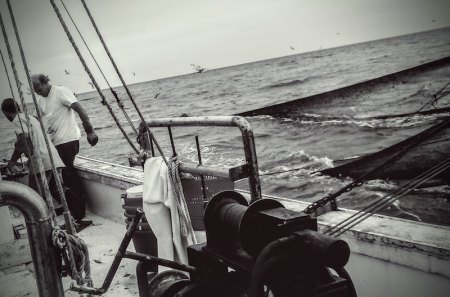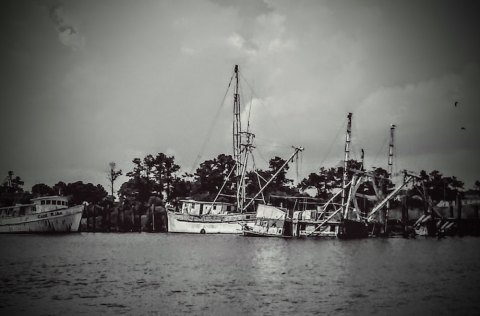MFC Votes to Crack Down on Trawling
Carrying out a very transparent agenda to support special interest groups, the Marine Fisheries Commission voted Thursday to accept a petition from the NC Wildlife Federation (NCWF) that warrants rules to the commercial trawl fishery – including a 3-day work week, day-time only fishing and drastic gear restrictions – that will shut down the state’s shrimping industry. The action took place at the MFC business meeting in Wilmington, Feb 13-15.
Turning out in good numbers to side with the NCWF petition was the NC Chapter of the Coastal Conservation Association, a group known nationwide for its mission to shut down commercial fishermen in the name of protecting public trust waters. They repeatedly discredited the state’s commercial fishing industry during the meeting, accusing fishermen of non-compliance and charging they don’t care about the resource. They even had a conference room next to the MFC meeting, where they held a membership drive and passed out propaganda.
Giving a little background, the CCA started almost 40 years ago in Texas by oil tycoon Walter Fondren, III. Since their first campaign to save redfish from commercial harvest, they’ve been driving force behind the closure of US commercial fishing. They do this by blaming commercial fishermen for declining fish stocks, while leaving out other environmental factors, such as development and oil drilling. The group is heavily funded and armed with a staff of lobbyists and attorneys, as well as publicists and politicians. They do their bidding by skewing government red tape and launching mass marketing campaigns.
“Something smells of corruption,” said Joe Romano, owner of Seaview Crab Company in Wilmington. Noting that NC shrimp is by far one of his biggest sellers, he said that he spends more time defending the commercial industry than marketing his own business.

As one of his last orders of business as our governor, Pat McCrory stacked the MFC Board in November with environmental cronies that were sure to vote the way of special interest lobbyists like the CCA. He appointed Koury of Raleigh to the at-large set and re-appointed Laughridge and Gorges, but switched their seats.
Perhaps the reason McCrory decided to keep Gorges on the board, but switch his seat from recreational to at-large, would be to let him serve his interests without violating board policy. According to the MFC ethics, for a commissioner to hold the recreational seat, s/he can not “derive more than 10 percent of annual earned income from sports fishing activities.” Gorges is listed as CEO of Seward Action, a company that caters to the needs of recreational fisherman, profiting on everything from clothing sales and boat sales to charter fishing trips.
Laughridge, a lifetime CCA member, was appointed to fill the at-large seat in 2013, then re-appointed to fill the recreational seat in November. Laughridge has financial interest in the recreational community through his for-profit website, ncwatermen.
Another bold example of the corruption was Dr. Louis Daniel, former director of the Division of Marine Fisheries, who presented the NCWF petition to the current MFC Board.
A year ago, Dr. Daniel resigned from his 21-year position with the Division of Marine Fisheries (DMF), which included nine years as the director. Daniel admittedly used his experience as a DMF employee to help craft the 99-page petition. He said he began working with NCWF shortly after leaving the division.
Moreover, Dr. Daniel had to explain why statements that he made as DMF Director conflicted with information he stands by now. Commissioner Janet Rose (commercial seat) pointed out that in 2013, Daniel went on record to admit that his statement that every pound of shrimp harvested yielded four pounds of discarded finfish was “not a good estimate.” Now, this number is a cornerstone of the NCWF petition, which he helped author. “Did you change your mind?” asked Rose.
Daniels stuttered as he admitted to making that statement in 2013. However, he never explained changing his mind about it.

Proving the measures will cost DMF staffers more time and resources (billed to taxpayers), Phillip Reynolds, MFC attorney, explained that the division would be tasked with implementing the rules according to the state’s mandate. First, new rules call for a “full fiscal analysis” on economic effects (a big detail that NCWF didn’t address in their petition). The literature provided by DMF staffers says: “significant time will be required by division staff to work with the Office of State Budget and Management to obtain an approved fiscal note. Measures will also have to be taken to consider how these rules will affect other fisheries."
Further exhausting state fishery coffers, the issue has the potential to be subject of a lawsuit brought on by commercial advocacy groups in attempt to protect their livelihood. DMF has been in legal battle with NC Fisheries Association regarding the closure of the southern flounder fishery. Last fall, a court ruling stopped the MFC-ordered closure on southern flounder.
Looking at their propaganda, the CCA was a major supporter of the commercial southern flounder closure.
Reynolds, whose office is with the state attorney general, said following the process would mean the rules will not be implemented for at least one year.
For the commercial industry, that buys a little more time to get the drastic rule changes stopped.
Side note: Jimmy Nobles, owner of West End Seafood in Greenville attended the public comment portion of the NC Marine Fisheries Commission Meeting Wednesday to stand up for the commercial industry. Shortly after he spoke, he fell ill in the lobby outside the meeting and passed away later in New Hanover hospital. A paramedic who’d attended the meeting (also to stand up for commercial fishermen) came to his aid until the ambulance arrived and the commission observed a moment of silence. Condolences to his family, and many thanks to him on behalf of NC commercial fishermen and families.




